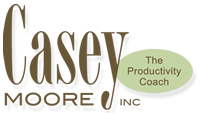
“Busy-ness” is a common complaint nowadays. Sadly, it’s often true. We are too busy—too busy to decide what’s important to us, too busy to change, too busy to do the work that produces the greatest results. This misdirected activity hurts both people and the bottom line. The reasons for our busy-ness vary. Inertia plays a role. Busy-ness becomes a habit and, for some, an addiction—behavior they feel compelled to do even when its costs outweigh its benefits. Workaholics Anonymous’ website notes that workaholics “feel the need to get just a few more tasks done before we can feel good about ourselves. When we complete these tasks we find just a few more, then a few more.” Workaholics may earn kudos at times but these are Pyrrhic victories, with their families and their souls its casualties. Still, “I do it for you” is their self-deceived rallying cry.
Not all busy-ness is workaholism. For many, busy-ness is a procrastination strategy. They let important but un-urgent projects (Stephen Covey’s “Quadrant II” activities) languish while expediting routine matters. “I haven’t started project X but I’ve answered all my calls and emails (even the irrelevant ones).” According to Dr. Linda Sapadin, author of It’s About Time!, the “Overdoer Procrastinator” faces “premature burnout.”
Avoiding Quadrant II activities leads to crises. It’s the kitty-litter syndrome. When you don’t clean the litter box daily, waste builds up. Soon your cat, disgusted by your inattention, takes her business elsewhere (to the carpet, in fact), creating a costly, time-consuming and utterly preventable mess. Multiply this scenario by 20 projects (and substitute “customer” for “cat”) and you find yourself in perpetual crisis. Over-commitment also fosters busy-ness. Few people like to say “no” – to others or themselves. “If someone makes a reasonable request, I ‘should’ agree,” they think, even if it means other things must slide. Saying “no” means risking others’ disappointment or anger, so they become people pleasers who often end up pleasing no one as work slips through the cracks and deadlines pass by, unmet. Finally, over-stimulation contributes to busy-ness. Like the exhausted toddler who runs around frantically, we don’t know when to quit. We want to avoid the difficult triage of prioritizing, so we cut back on sleep to cram it all in. Lack of sleep hurts productivity.
So what is the solution? First, you have to want to change. No one maintains any behavior without deriving some benefit from it. And no one changes until the costs of the old behaviors outweigh the pain of the new. To reach your tipping point, think about the benefits (e.g., praise from others, sense of importance, conflict avoidance) and costs (e.g., exhaustion, resentment, health problems) of busyness.
Next, assess your willingness to change and begin to take action.
- Create a “Don’t Do” list to remember busy-work
- Plan for the week.
- Breathe deeply for five minutes every day. You are a human being, not a human doing.
- Drive the speed limit. The discipline slows and refocuses your psyche.
- Sleep at least 7.5 hours a night, no matter what.
These new habits won’t cure busy-ness but they will help balance it with improved productivity. When you stop the busy-ness, you help your business.
